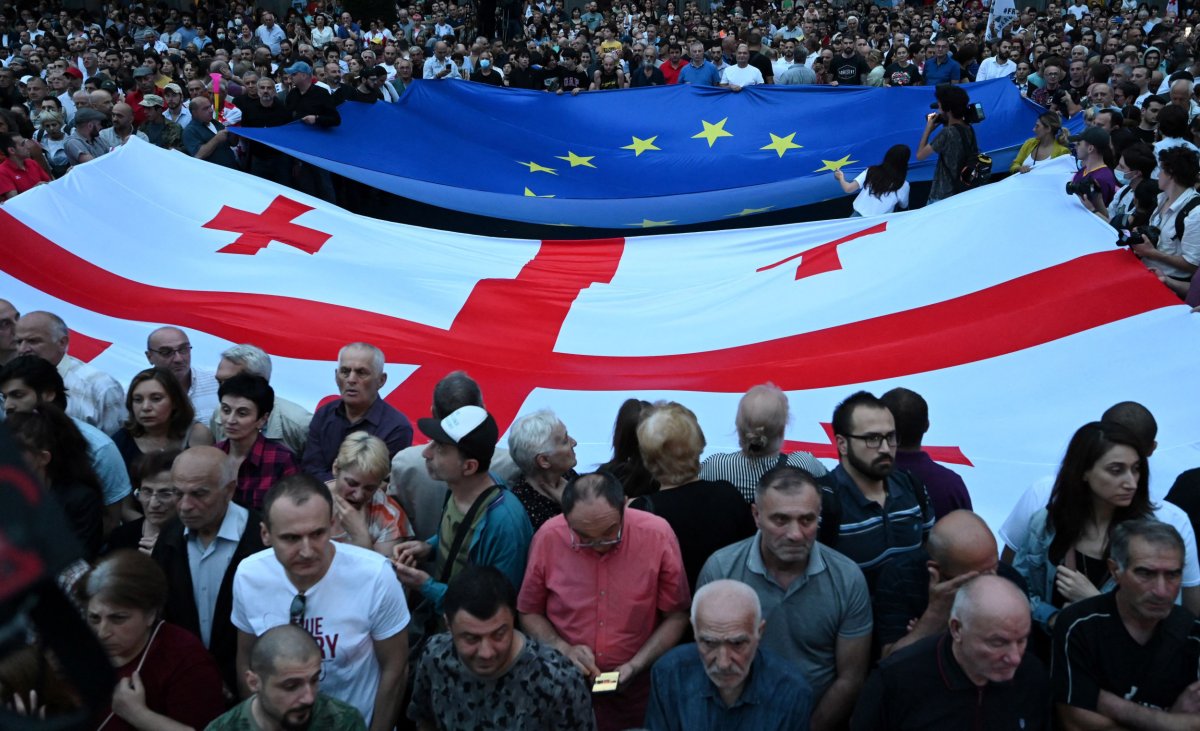Russia's full-scale invasion of Ukraine in February 2022 awakened the worst memories for Georgians. If Russian President Vladimir Putin's plan to take Kyiv within a few days was successful, Georgia, located in the Caucasus region, would have been under tremendous risk of expecting the same. Fortunately, that did not happen, owing to Ukraine's surprising resilience and the radical shift of the West's Russia policy—from appeasement to accountability.
Since taking power in 1999, Putin has aspired to strengthen Russia's domination over the former Soviet space because of his maniacal obsession with the belief that the collapse of the Soviet Union was Russia's major defeat. He has been particularly hostile toward Georgia, Ukraine, and Moldova, who have sought integration into the Western political, economic, and security systems.
Georgia was the first to experience Russia's full-scale aggression in 2008. Putin targeted Georgia for its NATO and European Union (EU) aspirations, and for its remarkable democratic and institutional reforms, which Putin saw as Georgia's deviation from the Russian orbit. Russia's aggressive behavior in its neighborhood over the years, in part, was a result of the West's weak response to Russia's imperialism. Even though, in 2008, Putin succumbed to Western pressure to halt his march on the Georgian capital, Russia never faced any accountability for its invasion and illegal occupation of Georgia's two regions, Abkhazia and South Ossetia. Shortly after the war, the West was back to business as usual with Russia. Such an approach, which resembled the World War II-era policy of appeasement, did not help avoid Russia's aggressive behavior. On the contrary, it emboldened Putin to pursue further brazen offences, such as the annexation of the Crimean Peninsula in 2014, and the waging of proxy wars in Ukraine's Donbas region.

Putin's invasion of Georgia in 2008 took place four months after NATO denied the Membership Action Plan (MAP) to Georgia and Ukraine at its summit in Bucharest in April 2008. At the summit, in an effort to appease Putin, France and Germany, along with some other EU nations, vetoed the MAP decision, despite its support by most NATO members. Putin took the denial as the West's recognition of Russia's "spheres of influence," which emboldened him to march on Georgia just four month later. This was a clear illustration of the cost for Putin's appeasement, but it would take 14 more years for many Western nations to realize it.
In 2008, Putin failed to accomplish his main objective of overthrowing a democratically elected government and changing Georgia's foreign policy course. Therefore, since the 2008 war, Georgia has been at a heightened risk of Russia's recurrent aggression, especially since Georgians have never changed their goal of EU and NATO integration.
Russia's invasion of Ukraine in 2022 was a turning point in many respects. Most importantly, the war awakened the West and triggered an unprecedented unity of democratic nations over Russia's accountability. The West finally realized that any further appeasement of the Kremlin would be detrimental to the international rules-based order. Although belated, this policy shift of the West has a potential to limit Russia's imperialism and future aggressive behavior. This is the first time that Russia has paid a heavy price for its aggression, with a damaged global reputation, enormous military losses, weakened economy, and geopolitical setbacks.
This situation significantly reduces the imminent risk of Russia's recurrent aggression against Georgia, at least for the time being. Firstly, Putin already knows that any of his following aggressions will result in enormous consequences for Russia. Moreover, Putin just cannot afford another war while Ukrainian resistance significantly challenges his appalling war effort in Ukraine. Today, Putin is in damage control mode to save face domestically and globally, as well as to avoid any challenges to his power and internal stability in Russia.
After the war is over in Ukraine, the West will need to address Russia's imperialism and aggressive behavior with continued unity, consistency, and resilience. The West should not weaken their stance against Russia's offences by any means and should exert every effort to make Russia pay the highest price possible for its aggressive behavior.
This approach of the West is also essential to save Georgia from any of Putin's potential aggressions. The West should finally take courage and expedite Georgia's EU and NATO integration process, along with that of other aspirant countries. The appeasement policy with regard to Russia needs to end. Had the West done this earlier, we may have avoided Russia's aggressions in 2008, 2014, and 2022, along with their devastating global consequences.
Akaki Dvali is a senior counsellor at the Permanent Mission of Georgia to the United Nations in New York.
The views expressed in this article are the writer's own.
Uncommon Knowledge
Newsweek is committed to challenging conventional wisdom and finding connections in the search for common ground.
Newsweek is committed to challenging conventional wisdom and finding connections in the search for common ground.
About the writer
To read how Newsweek uses AI as a newsroom tool, Click here.






